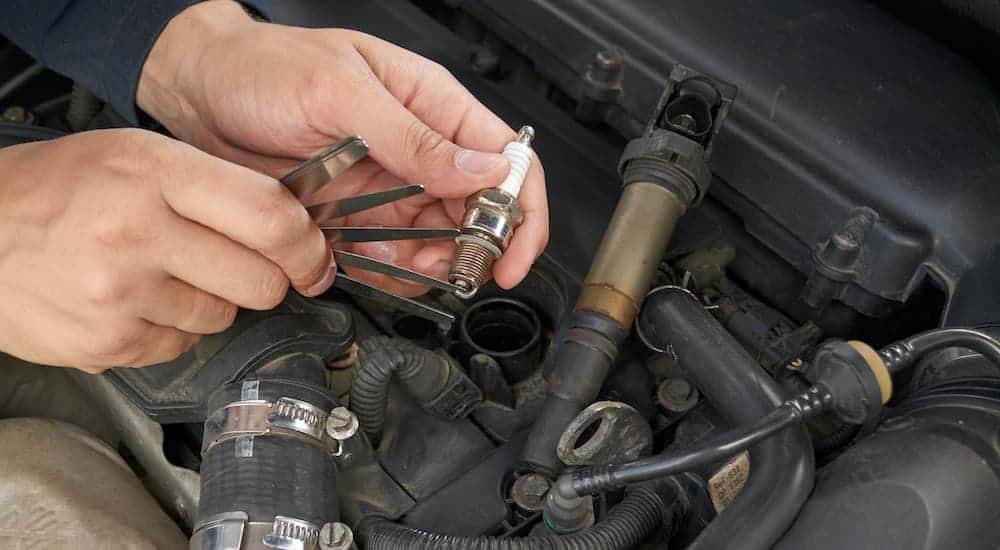Did you know that without spark plugs, your vehicle won’t run (unless it is a diesel, like many trucks from Ford, Chevy, and other manufacturers)? Spark plugs may be among the smallest engine components, but they are a key element in making a gasoline engine run. An internal combustion engine operates by mixing fuel and air in the cylinders and then igniting the mixture. The spark plugs’ job is to provide consistent and perfectly timed ignition to keep everything running smoothly. If your truck isn’t diesel and you notice the engine sounds odd, then it might be a spark plug issue, and you should start looking for a Chevy or Ford service near you.
Now you probably won’t wake up one day to find your spark plugs missing, but over time your spark plugs will corrode and become less effective at their job. When this happens, you will begin to suffer a variety of issues, from reduced fuel economy to potentially damaging engine knock. Because of this, is it important to stay on top of your spark plugs and replace them before they wear out. Let’s break it down even further and take the guesswork out of spark plugs by discussing their function, the different types, and their benefits to your vehicle.
The Basics of Engine Operation
Gasoline fuels your car, but do you know its role in the engine cycle? The engine in your vehicle turns gasoline, which is a potential energy source, into movement through a process known as internal combustion. During the engine cycle, the engine’s valves fill the cylinder with a highly explosive mixture of air and gasoline. The engine’s piston moves upward and compresses this mixture to create higher levels of potential energy. Once the mixture reaches the peak of compression, the spark plug takes over by creating an arc of electricity that ignites the mixture of air and fuel to make a small explosion that powers your engine.

Types of Spark Plugs
Spark plugs must ignite the engine millions and millions of times as part of the ignition system. An engine rotates at thousands of revolutions per minute whenever it is running, and your spark plugs are firing every other revolution. Because of this, spark plugs are made from durable materials that ensure their performance and add to their lifespan.
Copper core spark plugs are extremely affordable and were once the most popular types of spark plugs on the market. However, with the advancement of technology, copper spark plugs have been replaced by platinum and iridium spark plugs that promise even greater performance and longevity. However, if your vehicle is an older model with a low-voltage distributor-based ignition, it’s best to use a copper spark plug rather than the newer platinum versions.
Platinum spark plugs are ideal for modern engines without distributors. They are the middle ground between copper and iridium options because they are moderately priced and offer a modest balance of performance and fuel economy. Since they operate at a lower temperature than copper spark plugs, they provide greater longevity. Double platinum spark plugs are the next step up from standard platinum spark plugs and yield better performance.
However, nothing compares to an iridium spark plug, which is the best on the market. Iridium spark plugs are made of extremely durable materials and feature advanced technology that delivers exceptional performance, reliability, and gas mileage. Because of this, you will find them in virtually all modern engines, and they should be your number one pick if your vehicle is compatible with them.
Things to Consider When Buying a Spark Plug
First and foremost, consult the owner’s manual of your vehicle to determine the manufacturer’s spark plug specification or recommendation. The manual will tell you the type of spark plug you need in terms of material and size. While choosing the wrong material can reduce your engine’s performance, if you choose the wrong size, the spark plugs simply won’t fit.
Once you determine the spark plug’s material and size, you may notice that spark plugs are usually designated as hot or cold. Spark plugs that are labeled as hot are better heat insulators, which means they transfer heat slower and remain hotter. Spark plugs that are specified as cold transfer heat faster and have a lower overall temperature. Generally, hot plugs are longer, and cold plugs are shorter. If you choose the wrong type, you can suffer from carbon fouling, overheating, or even smashing your spark plugs with the cylinder heads – so stick with the plugs the manufacturer recommended.
The last thing to consider when buying a spark plug is the style of the gap. While most modern spark plugs are pre-gapped to the exact specifications of the engine they are intended for, older plug designs will often require moderate adjustments during installation. These adjustments are made using a plug gapper tool and a gap gauge to adjust the spark plug within your vehicle’s necessary range.

The Benefits of Spark Plugs
Now that we’ve covered the basics of engine operation, the types of spark plugs, and things to consider when buying a spark plug, it’s important to understand the benefits of spark plugs beyond their main job of igniting your engine. Spark plugs are an integral part of the ignition process. As they age, they can become corroded and faulty, which can drastically reduce your engine’s performance.
Spark plugs that are working at their best improve engine response, acceleration, and fuel efficiency. A faulty or corroded spark plug can affect the engine’s combustion process and is noticeable by a rough engine idle. By replacing the spark plug, your engine will run smoother and respond more efficiently when you accelerate. This, in turn, directly affects your fuel efficiency since an engine with an effective spark plug does not have to work as hard to keep the combustion process going.
Ignoring faulty spark plugs is a hazard because you run the risk of damaging your engine and its components as well as reducing the reliability of your vehicle. When a spark plug is faulty and stops working, you can even begin to suffer from engine knock when the fuel and air mixture ignites from compression rather than from a spark. Left untreated, this can cause extensive damage to the engine.
Spark Plugs in Review
Although spark plugs are one of the smallest components in the engine, they pack a powerful punch and are the key to the ignition process that powers your vehicle. It’s incredibly important to ensure your spark plugs are in working condition to avoid potential hazards and increase your engine’s life and performance. In most cases, drivers notice a spark plug issue when the engine misfires, fails to start, or produces a rough idle. However, it is far better to catch the problem before it occurs by regularly changing your spark plugs by the manufacturer’s recommendation, which could be anywhere between 30,000 and 100,000 miles.
Whether you choose to regularly replace your spark plug based on mileage or when you notice a significant change in your engine’s performance, it’s important to ensure your spark plug performs at its best to avoid long-term engine damage. Spark plugs are relatively inexpensive and easy to replace, whether you choose to do it yourself or rely on a local mechanic or service department. Using this guide to spark plugs, you should have everything you need to understand the basics of engine operation and how to select the right spark plug to get the most out of your engine.

